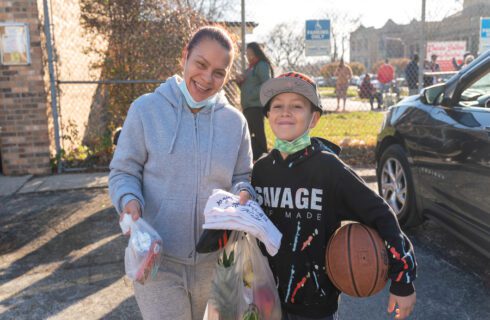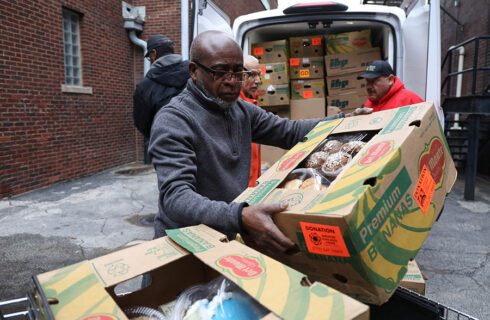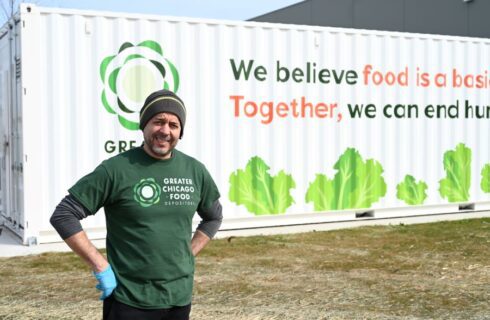When contemplating the influence of racism on food insecurity, Angela Odoms-Young invokes the image of a river – a well-known parable in public health.
Many people in Black, Latinx and Indigenous communities are drowning with unemployment, poverty and food insecurity. Racism and discrimination are what’s pushing them into that “river,” said Odoms-Young, a national expert on racial disparities in nutrition and health outcomes.
As a society, should we save each person who falls in the river? Or should we build an “anti-racism fence” that prevents them from falling in the river and deal with root causes? With an organizational focus on racial equity, the Greater Chicago Food Depository is striving to do both.
“The Food Depository is really bold in having those very courageous conversations to say, ‘We’re going to keep saving people from drowning, but we’re also going to start building this anti-racism fence to keep people from falling in,’” said Odoms-Young, an associate professor of kinesiology and nutrition at the University of Illinois-Chicago. “That’s admirable and important because other organizations will come on board.”

Angela Odoms-Young, at right, with an advocate at a youth policy day in Washington, D.C. in 2019.
Odoms-Young grew up in a middle-class family on Chicago’s South Side in the close-knit community of South Chicago. In 2000, after receiving her doctorate in human nutrition at Cornell University, she led a study on welfare reform that involved home visits to families in different Chicago neighborhoods – a turning point in her life and career.
“I was already interested in disparities but I wasn’t as knowledgeable about equity,” said Odoms-Young, who serves on the Food Depository’s Community Impact Committee. “This idea that there’s a difference, but the difference is systemic and the idea is that this is unjust. It’s not just an individual. It’s rooted in policy.”
The following interview on the intersection of food and racial justice has been edited for length and clarity.
Why are Black and Latinx communities disproportionately affected by the combination of COVID-19 and food insecurity?
It’s rooted in historic vulnerability. Black and Brown communities have that vulnerability that creates disadvantage. And that disadvantage makes them more susceptible to things like pandemics or any type of interruption that happens – both natural and man-made disasters. You traditionally have seen a disproportionate impact because of that historic vulnerability across the board. Now we’re thinking of COVID. Some years ago, we were looking at Hurricane Katrina.
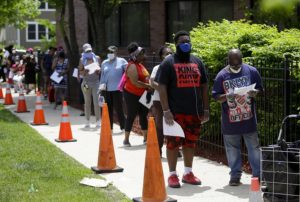
People line up for food at a pop-up distribution at the Apostolic Church of God in Woodlawn.
Is the lack of access to nutritious food in a community part of that historic vulnerability?
When you have concentrated poverty or racial segregation, resources are limited at the community level. Food access is one of those things that’s limited. When you look at race, it’s not only low-income people who live in communities that don’t have resources – it’s middle-income people who live in communities that don’t have resources.
People forget that it affects people who even have higher wages, who are considered working class, like a bus driver. You might think, why would a bus driver end up food insecure? Because of a history of discrimination. They may have a stable wage but haven’t had the opportunities and infrastructure to accumulate wealth. They are more vulnerable than a bus driver who’s coming from a family with a history of wealth.
A study from Pew Research Center indicates that white families have 13 times the wealth of black families and 10 the wealth of Latinx families. This is a significant gap.
Are historic vulnerability and systemic racism essentially the same thing or two different concepts that overlap?
Systemic racism causes the historic vulnerability. Systemic racism is the driver of historic vulnerability for Black, Latinx and indigenous populations. It’s not the only driver for all populations. You could look at other types of -isms that have created historic vulnerability. But one reason why race becomes so important is because, in the United States, it is probably the most dominant.
How do you define systemic racism? It seems to be at the root of many of Chicago’s most intractable problems.
Systemic racism is where you have public policies, institutional practices, cultural norms that reinforce differences and devalue people of one group as compared to another. And generally, that’s rooted in history. It disadvantages people of color and centralizes whiteness. When you look at the differential allocation of resources based on race and opportunity, it's based in the view of inferiority. We don’t bring that to the forefront, but a lot of ways our policies are rooted in the idea that you have groups that are inferior.
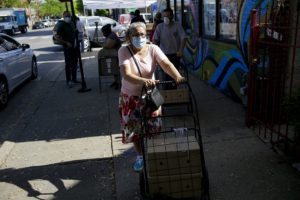
A woman leaves a food distribution in Little Village.
When you look at Blacks specifically, you look at uncompensated labor, both through incarceration in the early years and through slavery. You look at housing policies, such as redlining, that created wealth in one population and removes wealth, or doesn’t provide the opportunity to acquire wealth, in another population. That’s historic disadvantage and it creates historic vulnerability.
If you had one group that worked for no wages – literally you had a group that worked for more than a hundred years for no wages – and you had another group that benefited from that racialized capitalism, that group is going to be disadvantaged.
The pathway through which race influences food insecurity is at least partly driven by experiences of discrimination at an individual level, but that individual level is also compounded by history.
It feels like part of what we’re learning in this moment as a country is that we’re not as far along as we thought we were in terms of racial justice.
We are very optimistic. We all want to feel good about where we live. But there’s a history to this that didn’t end in slavery. Discrimination continues.
In the immediate, we need to figure out how to make things more equitable. Instead of giving people the same, equality, we need to give people what they need. And then eventually remove the barriers that keep people food insecure. If you remove the barriers, it’s going to affect people who are most at risk and those who are not quite as much at risk. If you remove the barriers, everybody benefits.
That’s where equity in charitable food becomes really key. And the Food Depository is at the forefront of that, really focusing on communities that need more support and looking at equity in the sense of that historic disadvantage.
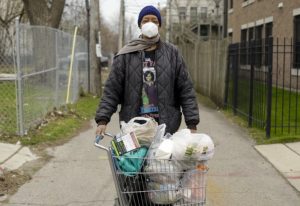
A man poses for a portrait after receiving bags of food at Chosen Tabernacle Ministries in Bronzeville.
We all need to focus on the immediate and strive to correct the past. If you target the root causes of hunger and help those who are most disadvantaged, that’s really going to be a help. That’s equity in itself.
Equity is really giving people who need the most what they need.
And it doesn’t mean taking away something from somebody who is less in need. It just means – this person needs a little bit, give them a little bit. This person needs more, give them a little more. It just means – crazy enough – we give both people what they need. Eventually, those folks are going to come closer and closer together, and everybody’s moving toward a better situation.
How important is it that the Food Depository and other charities are focusing more on racial equity?
It’s excellent. Food insecurity is one of those places where there is a result from systemic racism. When you look at the populations that are most food insecure, the data is there.
It shows that the Food Depository is responsive to data, responsive to evidence and that they are focused on making sure that the people who are most in need get the resources that they need. It’s also dealing with some of the places where opportunities have been denied – like an employment training where you’re focusing on the root causes of hunger.
That is so important because when you look at internalized racism or interpersonal racism, a lot of that results from the fact that people believe poverty is self-inflicted. Some people believe that we’ve got to help the poor but it’s their fault. So calling out racism is very helpful.
That seems like an extension of the up-by-the-bootstraps myth that anyone can lift themselves out of poverty with a little more can-do spirit.
Exactly. They didn’t cause it. It’s just a few tough situations for that person. Jill encountered a few tough problems – well, guess what, it’s not just Jill. It’s whole neighborhoods. It’s community. People forget. They think it’s the individual. They think if I help one person at a time. … There are very well-meaning people who feel if they help a few people that eventually they can pull up a few individuals and it will have an impact on society. And it will have an impact, it’s a few individuals, but guess what, the policies are still there.
It helps to call it out – we’re not just helping Black and Brown people. We’re also acknowledging that society and policies play an important role.
Many people are feeling discouraged right now. They’re feeling like we’ve taken a step backwards as country. … What gives you hope?
What gives me hope is that it becomes clearer and clearer and clearer – the why. In the past, we’ve tried to deal with the results of the why. And hopefully, I have hope that maybe we’ll start dealing with the cause, not the results.
I am hopeful that maybe one day, even if it’s not in my lifetime, we will get at the root cause of these things. Not trying to sew a patch on it, but get new jeans.
As more people start to acknowledge structural racism, systemic racism, and we have more conversations, maybe we will look at getting new jeans and not patches. Honestly, I’m hopeful because it seems like every time we have one of these things, people become more and more aware.
This has happened over the last hundreds of years, not just now, and the root cause of it is systemic racism. Eventually it will lead to more action and that’s very exciting.
The Food Depository, by stopping people from drowning who are more likely to drown, they are actually saying that these people matter. We’re going to give them the support that they need to contribute to society in a way that benefits us all.
Share This Post

